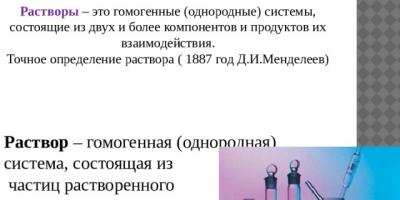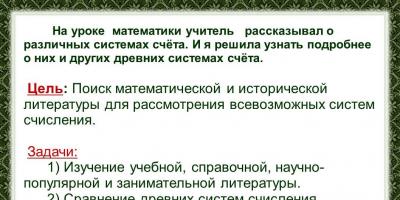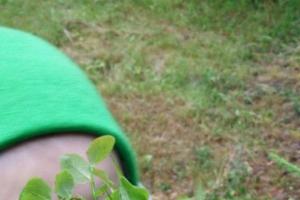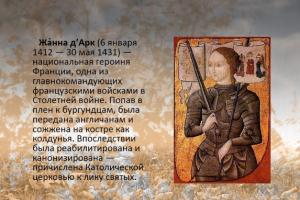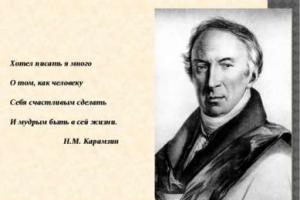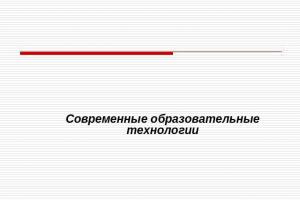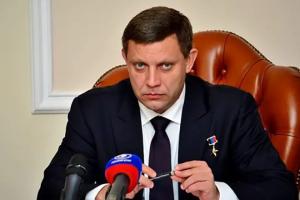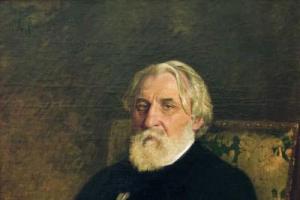Gogol's story "Taras Bulba" is an ambiguous work. On the one hand, it seems to glorify the unimaginable strength of the Russian spirit, on the other hand, it frightens the modern reader with descriptions of ancient atrocities. We can only thank fate that we did not have to live in that harsh time.
All the values of the Cossacks, their means of achieving goals and way of life look today as utter savagery.
Meeting of the Bulba family
The plot is probably still remembered from school: the old Colonel Taras Bulba, having waited for his two sons, the elder Ostap and the younger Andriy, from the Kiev Academy, goes with them to the Zaporozhye Sich, because his attitude towards all these “primer books and philosophies” skeptical. The old Cossack considers hot battle and male camaraderie to be true science.
His sons are both healthy, handsome young men, “over twenty years old.” They have different personalities: the characteristics of Ostap begin to become clear from the very first page. As soon as he returned home, he got into a fight with his own father, not allowing him to make fun of himself (old Bulba found his son’s “scrolls” funny). We must give credit that the colonel was not angry with his eldest son, but quite the opposite: he was delighted and wanted to fight with the younger one. But this one is cut from a different cloth, and my father immediately says: “Eh, you’re a little bastard, as I see it!”
Personality of young Ostap
Gogol describes the personalities of his heroes in few but expressive phrases, and Ostap’s characterization is somewhat more sparse than others. The man is a straightforward, loyal comrade, who never betrays his accomplices in Bursat’s undertakings.
The eldest son of Taras is indifferent to learning - only the threat of being a monastery servant for twenty years, voiced by his father, forces him to take up science. And then it turns out that his abilities are no worse than those of others, but still Ostap almost never thinks about anything other than “war and riotous revelry.”
At the same time, kindness is not alien to his heart (though with reservations for his “severe and strong” disposition and the same era). The eldest son feels sorry for the tears of the unhappy mother, and he leaves home, sadly hanging his head.

Cherchez la femme
Bulba's second son differs from the firstborn: Ostap and Andria are immediately brought to the reader's attention. The younger brother is not of such a gloomy disposition - he is more inclined towards science and various kinds of feelings. Dreaming of military exploits, he nevertheless thinks about many other things. It is interesting that Andriy showed himself at the Academy, often being the ringleader of various pranks, and his resourcefulness and quickness of mind sometimes saved him from punishment. In this sense, Ostap’s characteristics are the opposite: he did not strive for leadership, and did not consider it necessary to justify himself. He accepted the well-deserved punishment silently and resignedly, which indicates both the absence of cunning and the presence of pride.
The main difference, which the characteristics of Andriy and Ostap tell the attentive reader, is the place of a woman in the soul of each of them. If the older brother does not think about this, the younger brother learned the need for love early, as soon as he turned eighteen.
Taras Bulba's attitude towards the weak half of humanity is more than contemptuous. “A Cossack is not meant to mess with women,” is Taras’s categorical description. Apparently, Ostap’s father managed to raise him in the “correct” spirit. It didn’t work out with the younger one: while still studying, he meets a “beautiful Polish girl” in Kyiv, the daughter of a visiting governor, and falls mortally in love with her. and will lead him to death.

Training in combat
Arriving in the Sich, the elder Bulba immediately began to encourage the chieftain to make a military campaign (so that his sons would sniff gunpowder). Having received a refusal, the old colonel bursts into an angry tirade, the meaning of which is that life without war is meaningless.
In the end, Taras finally gets “lucky”. A Cossack comes to Kosh with the bad news that throughout Ukraine the Poles are oppressing the Orthodox people, and even the churches now belong to the Jews - in order to serve the service, you have to pay the “Jews.” Having killed a few of the sons of Israel in the vicinity of the Sich, the Cossacks set out on a valiant campaign and come to the fortified city of Dubno, whose inhabitants are ready to fight to the last, but not to surrender to the mercy of the Zaporozhye army. It cannot be said that this position is incorrect: the description of the military exploits of the Cossacks does not at all suggest thoughts about the mercy shown, where there: wherever the brave warriors passed, they burned, killed, robbed and tortured - these, Gogol repeats, were the customs of that cruel time .

Reason and Passion
So, Dubno does not surrender, but its inhabitants are in a difficult situation: there is no food in the city, the surrounding villages have been plundered, and the Cossacks are stationed in front of the walls, intending to hold the siege until hunger does what weapons could not.
During the battles, it becomes finally clear what Taras’s eldest son, Ostap Bulba, is like: the description given to him by his father is the most flattering: “In time he will be a good colonel, and even one who will put his dad in his belt!” The eldest of the brothers, despite his rather young age (he is twenty-two), manifests himself as a man created to “carry out military affairs.” He is brave, cold-blooded, prudent in battle, and is able to sensibly assess his position and the strength of the enemy. His thoughts are occupied with victory - and he finds a way to achieve what he wants, even by temporarily retreating.
The difference between the brothers is immediately definitively determined: the characterization of Andriy and Ostap does not contradict what is already known about them, on the contrary, it is supplemented by new facts.
The youngest son of Taras sees “mad bliss and rapture” in the battle. He is not inclined to make preliminary assessments or thoughts: his nature is more passionate and sensual than calm and reasonable. Sometimes, with one onslaught of desperate courage, he manages to accomplish the impossible, and then the father approves of his son, still giving preference to the eldest: “And this is a good... warrior! Not Ostap, but a kind, kind warrior too!”

Andria's betrayal
Under the besieged city, the Cossacks are tossing around with boredom, drinking and playing tricks. The Zaporozhye discipline described by Gogol would have horrified a military specialist: the entire camp is asleep, and only Andriy wanders around the steppe with a constricted heart - no less, anticipating his fate. And indeed: here someone’s ghostly figure is sneaking. Amazed, he recognizes the maid of his Kyiv acquaintance: the Tatar woman, having escaped through an underground passage from the besieged city, came to ask Andriy for bread for her lady.
The behavior of the heroes during subsequent events is consistent with the personality of each of them. We can say that Ostap, Andria is completed - all that remains is to understand how spiritual qualities can determine fate.
The youngest member of the family, sensual and seeking pleasure, loses his head. Having gone to a beautiful Polish woman with bread, Andriy forgets his duty and his homeland. “You are my homeland!” he says to his beloved, and remains in the besieged city, going over to the side of the enemy.
The news of his son's betrayal, brought by the Jew Yankel, hurts Taras. In vain are attempts to console him: the old colonel remembered that “the power of a weak woman is great... that Andriy’s nature is pliable on this side.”
Death of sons
However, awareness of his filial weakness does not prompt Bulba to forgive - he is stubborn, cruel and merciless in his principles: having lured his youngest son into the forest during a battle, the father kills his son with the words that have long become popular: “I gave birth to you, I gave birth to you, and I’ll kill you!”
Having lost one son, a father gives all his love and pride to another. Brutally hacked to death in battle, and miraculously surviving, he goes to Warsaw itself to try to rescue Ostap from captivity - but, unfortunately, this cannot be done. The father did not even have a chance to see his son (not least because of the temper of Taras himself, who was unable to endure the insults of the guard, whom the familiar Yankel tried to bribe with flattering speeches).

Having abandoned hope, old Bulba is present in the square where the prisoners are executed, and the characterization of Ostap given earlier is again confirmed. Under torture, he does not make a sound, so as not to give the “heretics” Poles the pleasure of hearing the Cossack groans. His soul trembled only once, during the most severe torment, and then, succumbing to weakness (probably the only time in his short life), Ostap shouted in mental anguish: “Father! Where are you! Do you hear?!” And Bulba, standing among the onlookers, answered his beloved son: “I hear!”
Gogol characterizes the hero, will suggest the folk poetic origins of imagery (comparisons, epithets), the lexical composition of passages (“His knightly qualities have already acquired the broad power of the qualities of a lion”; “Like a swimming hawk...”; “the old man will put it in his belt”; “Ostap endured torment and torture like giant. Neither a scream nor a groan was heard..."; "now he would like to see a firm husband who would refresh him with a reasonable word and comfort him at his death"; Author's commentary, selection of figurative and expressive means, the leading role of the hero in the climactic moments of the story ), will reveal the generalized nature of the image, its typical features.
Taras is the embodiment of the ancient ideals of Sich knighthood, Andriy is the embodiment of the views of the unstable part of the Cossacks, prone to compromise and outright betrayal, and Ostap is the embodiment of the young Zaporozhye force maturing among the people. Taras kills Andriy as a traitor to his homeland, despite the fact that he is his son. In the scene of filial murder we see the greatness of Taras’s character
Ostap was always cool-headed and never lost his temper. At twenty-two years old, he could foresee and measure the danger in order to better overcome it later. The traits of a future leader are noticeable in Ostap. The author compares Ostap with a giant, because giants and heroes have always been defenders of their native land. The greatness of Ostap’s soul lies in his loyalty to the Zaporizhian ideals: to die for his native homeland. Andriy, by his mental make-up, is an individualist and an egoist. He was distinguished by delicacy, passion, ardor of feelings that prevailed over reason.
The tragic pathos of the last chapters of the story“Taras Bulba” requires certain pauses: it is necessary to give the opportunity to internally feel, relive the most sorrowful pages of Gogol’s narrative. And the first questions to them are questions about what was felt, about the impression that the ending of the story, the tragic fate of the heroes, leaves in the soul. Heroes do not die - they gain immortality, because they are convinced that “not a single generous deed will perish.” Death, depicted in Gogol's story, "...is sanctified by an aura of valor, it is spiritual, although Gogol does not skimp on describing rivers of blood and the sight of severed heads." Dying, the Cossacks understand that the struggle is not over, that their death is not in vain, but is necessary for future victory. In this belief in the immortality of the people lies the true optimism of the story, its heroic pathos, folk, life-affirming beginning.
based on the story, Taras Bulba”
Taras Bulba was one of the indigenous, old colonels: he was all about scolding anxiety and was distinguished by the brutal directness of his character. Taras did not like the fact that traditions and customs began to be adopted from Poland and luxury appeared: servants, falcons, dinners and courtyards. He loved the simple life of the Cossacks and quarreled with those of his comrades who were inclined to the Warsaw side, calling them flakes of the Polish lords. He considered himself a legitimate defender of Orthodoxy.
Bulba had two sons and a wife. He considered his youngest son a little bastard. He treated women poorly. I thought that they always interfere with real Cossacks. He thought that if he stayed at home for the rest of his life, he would become a buckwheat sower, a housekeeper, look after the sheep and pigs, and be a wife with his wife.
Bulba jumped on his Devil, who recoiled furiously, feeling a twenty-pound burden on himself, because Bulba was extremely heavy and fat.”
Taras went to bed early and woke up early. I always liked to cover myself warmly.
Bulba's wife saw her husband 2-3 times a year, and then for several years there was no word or word from him. She endured insults and sometimes even beatings.
Taras Bulba was very excited and angry, he prepared himself carefully, and was responsible. He spoke well, thereby encouraging people in need. He was proud of his son when he learned that he had been chosen as chieftain. He didn't like traitors. And even when his son turned out to be such a traitor, he killed him with the words: “I gave birth to you, I will kill you!”
After the execution of Ostap, Taras walked around Poland and robbed with his army in honor of his son. Then, because of this, everyone started looking for Bulba. When they found Taras, they ordered him to be burned at the stake in front of everyone. Burning on the pillar, Taras saw his own people, and he warned them to run away, thereby saving them. His death was not in vain; he died as a hero of that time.
Ostap is the eldest son of Taras Bulba. He was 22 years old. Proud, very cold-blooded, did not tolerate insults and could even hit his own father for this. He studied at the Kyiv Bursa. A year later, my brother and I came to see my father. Ostap took care of his brother, loved his mother, wanted to be like his father, respected and feared him; he was the main judge for him.
When Andriy was killed, he felt sorry for him and wanted to give his body to honest land so that his enemies would not scold him and birds of prey would not peck him.
It seemed to Ostap that the battle path and the difficult rank of carrying out military affairs were written in his family. Never at a loss or embarrassed by any incident, with a composure almost unnatural for a twenty-two-year-old, in an instant he could measure all the danger and the entire state of affairs, and could immediately find ways to evade it, but evade it in order to then it’s better to overcome it. Already experienced confidence now began to signify his movements, and the inclinations of the future leader could not help but be noticeable in them. Largeness was heard in his body, and his knightly qualities had already acquired the broad strength of the qualities of a lion.”
The Cossacks said about Ostap: “Here is a new ataman, but he leads the army just like the old one.”
When he was executed, he was silent, silent as he bled. And then he started calling his dad.
Andriy is the youngest son of Taras Bulba. More than twenty years old, and exactly a fathom tall. He studied with his brother in Kyiv Bursa. He loved his mother more than his father.
Andriy said: “Let only now some Tatar woman know what kind of thing a Cossack saber is!”
Andriy was completely immersed in the charming music of bullets and swords. He did not know what it meant to think about, or calculate, or measure in advance his own and others’ strengths. He saw mad bliss and rapture in battle.<…>And more than once old Taras was amazed, seeing how Andriy, compelled only by passionate passion, rushed to something that a cool-headed and reasonable person would never have dared to do, and with his one frantic onslaught he produced such miracles that the old ones in battles could not help but be amazed.”
Andriy really didn’t like the fact that they kept the city hungry. He and his father had different natures, and they look at the same thing with different eyes. He treated women differently. He sold the homeland of his comrades and his father and brother for a Polish woman. He was perplexed by the fact that because of them, people ate land and livestock out of hunger.
When he was lured angry and furious into the forest to his father, all rage disappeared from him, he felt guilty for this. And therefore he obeyed his father like a child; got off his horse, knowing that now his father would kill him. He died as a traitor.
He was beautiful dead: his courageous face, recently filled with strength and a charm invincible for wives, still expressed wonderful beauty...”
Taras's eldest son Ostap resembles his father in many ways; Without the slightest error, he can be considered flesh of flesh and bone of old Taras. Ostap is as much a product of his era and its spirit as Taras. The only difference between them is age. What is already fully determined in Taras and constitutes the essence of his nature, in his son it is already laid down, but has not yet been fully determined, but develops and becomes clear with the course and development of the story, and one can see how quickly the process of formation of a daring “knight” and Cossack
Arriving at his home from Bursa after a long separation, Ostap looked embarrassedly at the ground and showed great shyness; she, however, instantly disappeared when his father decided to laugh at him; Ostap immediately discovered his true qualities: a high concept of his honor, the ability to defend it before anyone, even before his father, and great physical strength. Having discovered these properties, he immediately earned his father’s approval and the prediction that he would “be a good Cossack.”
Indeed, Ostap contained everything that constitutes the integral properties of a “good Cossack,” but at the time of his arrival he was not yet one, and old Taras, with his word “will,” precisely expressed the idea that Ostap so far represents only good material for the future a Cossack, and he will become one when he gets to the Sich, let him smell gunpowder, and show himself in action, that is, in battle, since only the Sich is a real school for a Cossack, and the real business is battle. Everything that Ostap did before was so-so, nonsense, worth nothing, but the Sich and the battle are another matter, this is exactly what a Cossack should do.
As a matter of fact, Ostap looked at science and the Bursa, and on the other hand, at the Sich and at the virtues and responsibilities of a Cossack. While still a twelve-year-old boy, he showed all the signs of such a worldview. He did not want to study and, sent to Kyiv, to the bursa, ran away that same year, but they mercilessly tore him out and returned him; four times he buried his primer in the ground, not wanting to sit behind a boring book, and four times they imprisoned him for a new book, but even this would not have helped, but Taras thought of threatening Ostap that he would keep him for twenty years in monastic services and would never allow him to to see Zaporozhye if he does not complete the course at Bursa.
Only this remedy turned out to be valid, and eight years later Ostap and his younger brother Andriy completed a full course of science in the then college, although this was done in order to completely forget the whole science and learn another, more necessary in the life of that time, i.e. military affairs. The author himself says that this science of that time, the methods of teaching and the selection of teachers could only harden the character of the students, impart to them the firmness that has always distinguished the Cossacks, develop in them a sense of solidarity, which later turned into “comradeship”, a kind of military organization known as the Sich or Zaporozhye.
This is exactly what Ostap was like back in school; he was always considered one of the best comrades, but did not show activity in school pranks, since he rarely took on the role of leader in dangerous and daring enterprises - to rob someone else's garden or garden, but he was always one of the first to appear under the banner of an enterprising student, and never betrayed his comrades; no whips or rods could force him to do this. He was stern towards motives other than war and wild life; at least he almost never thought about anything else. He was straightforward with his peers. He was as kind as was possible with such a character and at that time. Naturally, having such inclinations and views back in school, Ostap very soon turned into what, at that time, was defined by the expression “good Cossack.”
Finding himself together with his father and brother in the Sich, Ostap with all his ardor threw himself into this riotous sea and instantly forgot his father’s house, and the school, and everything that had previously worried his soul, and surrendered to a new life, soon becoming in good standing with the old Cossacks . He quickly got used to the life of the “free Cossacks” and even in many respects rose above the general level with his dexterity and strength. All that was missing was baptism by fire and sword, but this was soon accomplished, and Ostap emerged from it with honor. In the battles with the Poles, he showed so much courage and dexterity that he earned the approval of all experienced Cossacks, and the Uman kuren even chose him as a kuren atamans instead of the murdered Bearded. The Cossacks were guided in their choice by the following consideration: “It’s true that he is the youngest of all of us, but he has a mind like an old man,” and the Koshevoy expressed the following opinion about the new ataman: “Here is a new ataman, but he leads the army as if the old one " In a word, on his first campaign he turned into a “good Cossack” and fully deserved this reputation.
He began to completely resemble his father, revealed the same belligerence, courage, contempt for peaceful life; severity in handling, energy, enterprise and perseverance. If Ostap were destined to live in the world as long as Taras lived, then he would develop into exactly the same type as his father. The death of Ostap is worthy of note; it is as heroic as his father's death. Dying on the scaffold at the hands of the executioner, he still triumphed over the enemies of his homeland and thought about it.
His dying cry: “Father! where are you? do you hear all this? ..” must be understood in the sense that Ostap, looking at his father as the embodiment of the entire Cossacks, all the cherished traditions of the homeland, remembered him and bequeathed holy revenge to him, and not even to him personally, but in his person to the entire homeland, to everything to the Cossacks, because he looked at the torment of his body, at his terrible torment, as if it were the torment of his entire homeland; these torments were the personification of the suffering of all of Little Russia at the hands of enemies. With his silent contempt, Ostap triumphed, as if confirming Gogol’s exclamation: “Can there really be such fires, torments and such strength in the world that would overpower Russian strength!”
Characteristics of Ostap from Taras Bulba
In Nikolai Gogol's story “Taras Bulba” there are several semantic centers. Historical past, a fragment from the life of the Zaporozhye Sich and the fate of the three main characters - Taras, Andriy and Ostap. I would like to dwell in more detail on the last character. Taras Bulba embodies the image of a national hero, a fighter for faith, Motherland and independence. Andriy seems to be some kind of rebel and traitor. What is hidden in the image of Ostap, the son of Taras Bulba? The characterization of Ostap from Taras Bulba will allow us to more fully answer this question.
Appearance
First of all, you need to pay attention to the appearance of the hero. In this story by Gogol, the main characters have a textured appearance, thanks to which some character traits can also be traced. Compared to the characterization of Andriy, references to the appearance of Ostap from “Taras Bulba” are quite scarce; they appear infrequently in the text of the story. So, in “Taras Bulba” the description of Ostap is presented as follows: “His body breathed with strength, and his knightly qualities had already acquired the broad strength of a lion.”
Already from the first lines of the work, it becomes clear that Ostap has character. The eldest son responds to Bulba's banter with a fist fight. Ostap is ready to defend his interests and dignity, despite the fact that his father is his opponent. The fight ends with friendly hugs and praise: Taras is pleased that his son showed his strong-willed qualities, and therefore did not want his sons to stay with their mother for a long time, he thought that this would soften them.
Seminary studies
It is known that Taras sent his sons to get an education in Kyiv, so that experienced teachers there could provide knowledge about the sciences and discipline. At first, Ostap had problems with obedience. He ran away many times, disrupted classes, and buried books. Perhaps this would have continued further, but Bulba took the situation into his own hands, threatening to send his son to a monastery. After this, Ostap took up his studies seriously. Not to say that he had talent, but Ostap had amazing tenacity. After months of reading and mastering logical, rhetorical and grammatical subtleties, Ostap became on a par with the best students. It must be said that studying at that time was very little like learning in the modern sense. The seminarians could not apply the acquired skills and knowledge anywhere; “everyone was far from experience.”
Attitude towards love
Ostap from the story “Taras Bulba” dreamed of going to the Zaporozhye Sich and becoming a Cossack. The family was completely not for him. Ostap did not think that one day he would lose his head because of his feelings for a beautiful girl. This outcome of events simply did not fit into his worldview. “He was harsh towards motives other than war and riotous revelry; at least I never thought about anything else.” The execution episode once again states that his wife and family are not important to him. In the last minutes, Ostap did not want to see his mother or hear the cry of his inconsolable wife.
Behavior in the Sich
Both sons of Taras Bulba quickly fell in love with the wild life. Ostap respected the laws of the Sich, however, he was still not so amazed by the cruel punishment of one Cossack for murder. Ostap was cold-blooded.
Fearing that the good fellows will be lost in partying and drinking, Taras asks the Koschevoy to break the peace agreements with Poland so that his sons can be hardened in battle. But events unfold somewhat differently, but in favor of Bulba Sr.
Ostap showed himself at his best: undaunted, daring, courageous warrior. “Ostap, it seemed, was destined for the path of battle and the difficult knowledge of carrying out military affairs.” He could accurately determine the danger, while knowing how to avoid it. His prudence and sober calculation made Ostap an excellent strategist. The twenty-two-year-old youth fought alongside experienced Cossacks. He was characterized by two most important things for a warrior: composure and an analytical mind. The makings of a future leader were visible in him; it is no coincidence that Ostap was chosen as the chieftain of the kuren.
Character
In the characterization of Ostap from the story “Taras Bulba”, a special place is given to temperament. Bulba's eldest son highly valued friendship and was considered one of the best comrades. In the seminary, being caught for some prank, he never betrayed his “accomplices.” He "was straightforward with his equals." The Cossacks highly appreciated this quality, because one of the main laws in the Sich was the law of partnership. The work does not mention any quarrels or clashes between Ostap and the Cossacks, since due to the above-mentioned personal qualities of the young man, they could not have happened.
His strong-willed character is evidenced not only by battle episodes, but also by his attitude to his studies: despite the boring and uninteresting textbooks, Ostap still became an excellent student.
Ostap was kind. Andriy's death and his mother's tears hurt him painfully, but the young man tried not to show it. He was closer to his father than to his mother. He and Taras were united by the desire to give his life for the sake of serving his native land and the Ukrainian people. He was always attracted to stories about exploits, he dreamed of showing himself in battles, swinging a saber, defending his interests. He was not attracted to the “music of bullets”; Ostap looked at things more realistically than his younger brother. Taras Bulba himself was more impressed by Ostap’s character.
Death
Ostap was not destined to live a long life, but a worthy one - yes. He is executed in Warsaw under the curious gaze of a crowd hungry for spectacle. The prisoners were led to the scaffold, Ostap goes first. He looks proudly at the Poles and does not greet them. The Cossack appeals only to the Cossacks, so that they do not disgrace the Cossack glory and do not utter a word while the executioners torture them. Bulba's eldest son will be executed first. He did exactly what he had told the other captives to do: he steadfastly withstood the torment. Ostap was silent even when the Poles broke the bones in their legs and arms.
Ostap forever remained faithful to his Fatherland, the Cossacks and the Christian faith. Literary scholars consider the image of Ostap from Taras Bulba to be collective. It deciphers not so much the human personality as the very idea of freedom and the struggle for independence. Therefore, the execution turns out to be not just the death of Ostap, but the death of the values proclaimed in the story: faith and Motherland.
A detailed description of Ostap will be useful for students in grades 6-7 when searching for materials for an essay on the topic “Characteristics of Ostap from the story “Taras Bulba.”
Share on social networks!

